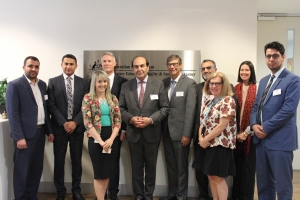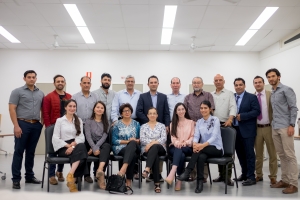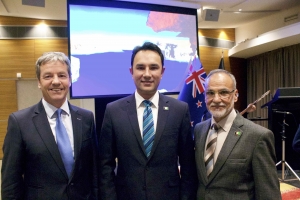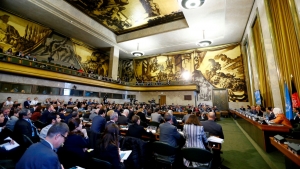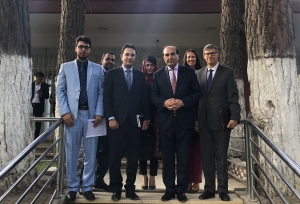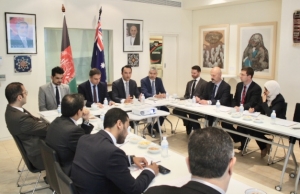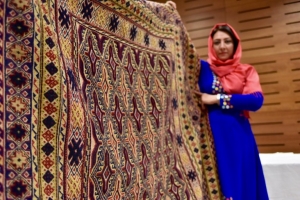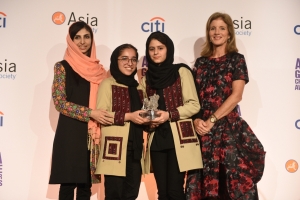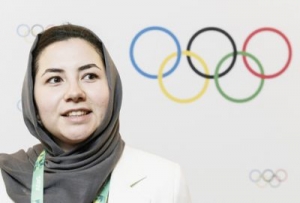The higher education delegation of Afghanistan completed its visit to Australia on 23 November 2018, departing Brisbane back to Kabul. The delegation was led by Professor Hamidullah Farooqi, Advisor to the President of the Islamic Republic of Afghanistan on Higher Education and Chancellor of Kabul University. The one week visit, from 19 to 23 November was sponsored by the Government of Australia and direct support of Department of Foreign Affairs and Trade.
The Afghan delegation have visited eight universities and higher education institutions. In Melbourne the met senior representatives of Melbourn and RMIT Universities. In Perth the delegation visited the Curtin University. In Sydney they met officials from University of Technology of Sydney and at last stop they were able to call on Queensland and Grafitt Universities' authorities. In Melbourne, the Higher Education delegation visited Open University Australia consortium.
The purpose of this tour of education delegation was to identify and utilize the potential, expertise and experiences of selected Australian universities towards enhancing the quality of higher education in Afghanistan. This covers cooperation in the various fields including agriculture, mining, water management, curriculum development, distance and online learning and PhD programs.
Australia has been one of the major partners of Afghanistan. Higher education has become a priority sector in bilateral relations.
The Afghan community in Queensland hosted HE Ambassador Wahidullah Waissi for a dinner reception in Brisbane on 24 November 2018. Ambassador Waissi discussed about embassy's consulate affairs, current issues and next year's 50th anniversary of Afghan-Australian political relations. Ambassador Waissi called on community representatives, consisting of women, men and youth, to participate and celebrate 2019 as year of friendship between both countries together with Australian communites.
The Afghan community representatives in Queensland appreciated embassy's efforts on consular affairs and ontime responses. Dr. Mahmood, a senior representative of this community, who was speaking on behalf of the community, confirmed their community's readiness for celebration of 50th anniversary of Afghan-Australian political relations in Brisbane by conducting cultural activities and join programs with Government of Queensland.
On his official visit to Western Australia, HE Ambassador Wahidullah Waissi calls on Hon Kim Beazley AC, Governor of Western Australia in Perth on 28 November 2018. The Governor of Western Australia welcomed Ambassador Waissi in the Government House. Both sides discussed about history, current and prospects of bilateral relations between Afghanistan and Australia.
Hon Governor Beasely discussed areas of cooperation between Australia and Afghanistan, Australian presence in Afghanistan, and their engagement on counter terrorism. He offered his best wishes to people and government of Afghanistan.
Ambassador Waissi also discussed enhanced bilateral relations between both countries, especially on security and military, long-term engagement on developemnt cooperation, including economic, people to people and humanitarian assistance. He also discussed about next year 2019, which marks 50th anniversary of political relations between both countries and joint activities and programs.
Aiming to facilitate consular related services of the Islamic Republic of Afghanistan in New Zealand with greater focus on business to business cooperation, the Government of Afghanistan has recently assigned Mr. Mohammad Yasin Hotaki, an Afghan-origin New Zealand`s citizen as first Honorary Consul of Afghanistan in New Zealand.
Mr. Hotaki is based in the city of Auckland, having full jurisdiction throughout New Zealand. He facilitates and promotes commercial activities, doing business, including consular services with particular focus on B2B matchmaking between Afghanistan and New Zealand.
The Honorary Consul is a private individual who works on voluntary basis with no remuneration under full instruction and authority of the Ambassador (in the case of Afghanistan, the Ambassador to Australia and non-resident Ambassador to New Zealand and Fiji based in Canberra).
The Embassy is confident that the commencement of activities of the first Honorary Consulate of Afghanistan to New Zealand has opened a new chapter in the history of bilateral relationship between the two friendly nations.
For more information, please visit here.
Geneva Conference on Afghanistan: Joint Communiqué
Securing Afghanistan’s Future: Peace, Self-Reliance and Connectivity
Preamble
The Geneva Conference on Afghanistan, co-hosted by the Government of the Islamic Republic of Afghanistan and the United Nations, was attended by delegations from 61 countries and 35 international organizations, and representatives of civil society, the private sector and the media. H.E. Mohammad Ashraf Ghani, President of the Islamic Republic of Afghanistan and H.E. Rosemary A. DiCarlo, Under Secretary-General of the United Nations, delivered keynote addresses. The conference was co-chaired by Minister of Foreign Affairs Salahuddin Rabbani, Minister of Finance Mohammad Humayon Qayoumi, and Special Representative of the Secretary-General Tadamichi Yamamoto. H.E Abdullah Abdullah, Chief Executive of the National Unity Government, concluded the conference.
Introduction
-
The National Unity Government (hereafter the government) and the international community met on 27-28 November 2018 at the United Nations in Geneva to renew their partnership and cooperation forAfghanistan’s peace, prosperity and self-reliance.
-
At the midpoint of Afghanistan’s Transformation Decade (2015-2024), participants noted the progress that has been made on Afghanistan’s path to self-reliance, but recognized that serious challenges including insecurity, poverty and corruption persist. These challenges require accelerating participants’joint efforts for the remainder of the Transformation Decade. To this end, participants reaffirmed their commitment to mutual accountability and delivery of mutually agreed commitments by both government and the international community for a political, social, and economic environment enabling Afghanistan to strengthen peace, security and sustainable development. The government’s delivery of its commitments will be key for sustained international support.
-
Participants underlined the need to deepen regional cooperation in all spheres, including the political, security, economic and social to the benefit of the whole region.
-
Mutual accountability between the government and the international community guides the direction and content of reforms for achieving self-reliance. The conference reviewed the progress and reform achieved so far under the Self-Reliance through Mutual Accountability Framework (SMAF), and its deliverables for 2017-2018. Participants acknowledged progress in many of the reform areas and agreed that much still needs to be done, including: enhancing inclusive economic growth; reducing poverty; creating employment; fighting corruption; empowering women; and, improving governance, rule of law and human rights. In this spirit, and building on the SMAF, participants adopted the Geneva Mutual Accountability Framework (GMAF) with measurable reform objectives and commitments for the government and the international community for 2019-2020. The GMAF aligns deliverables with the Afghanistan National Peace and Development Framework (ANPDF) and its National Priority Programs (NPPs). Participants acknowledged the need for greater emphasis on implementation of NPPs and ensuring that their benefits reach all people, particularly those living in poverty.
-
In the run up to the conference, Afghanistan agreed to meet six benchmarks: 1) holding transparent, fair and credible parliamentary elections; 2) advancing anti-corruption, i.e. carrying out outstanding arrest warrants; 3) reforming the security sector, in particular by completing the biometric registration of police personnel; 4) meeting IMF benchmarks; 5) furthering private sector development by enacting key legislation such as the mining law and the land allocation law; and 6) finalizing implementation plans for the NPPs. Participants acknowledged the progress made with respect to these benchmarks over the past few months. Participants expressed concern that the benchmarks on anti-corruption, and on elections with respect to its technical conduct, have not been met fully, and requested a renewed focus on these important benchmarks.
-
Participants agreed that peace is essential for sustainable development. Participants acknowledged that, there is a new opportunity to seek peace in particular in light of the government’s peace offer in February 2018. The government’s offer to the Taliban of talks without preconditions has enhanced regional cooperation and bolstered a national, regional, and international consensus, providing a unique opportunity for a negotiated end to the conflict. Participants emphasized that peace must be underpinned by serious efforts and reform, as well as inclusive economic and social programs. Peace must also be based on a broad political consensus involving all of society; women’s full participation in the peace process needs to be ensured. Respect for human rights and the rule of law will strengthen opportunities for sustainable peace. Peace will end the suffering of civilians and bring about opportunities for growth and prosperity. Participants further acknowledged that peace has a strong regional dimension with benefits for Afghanistan and the region, and reconfirmed that Afghan-led and Afghan-owned peace processes must be supported by coordinated efforts of regional countries and the international community.
-
Participants welcomed the holding of the first Afghan-led parliamentary elections and secured by ANDSF in October 2018 and praised the significant number of citizens who voted despite intimidation. Participants also noted that organizational, technical and security difficulties hindered voting, and underlined the importance of addressing these and other shortcomings, including initiating legal processes if necessary, to ensure progress in electoral management. Participants called for effective preparations of presidential and other foreseen elections in 2019 to ensure maximum transparency, credibility, participation, and security.
Peace
-
There has been renewed focus on achieving peace in Afghanistan. Participants acknowledged and reaffirmed their commitment to an Afghan-led and Afghan-owned peace process, as articulated at the Kabul Process for Peace and Security Cooperation in February 2018 as a main forum and vehicle and endorsed at the Tashkent conference. Participants took note of constructive regional and international efforts, including the Quadrilateral Coordination Group, the International Contact Group on Afghanistan, the Moscow format consultations, SCO–Afghanistan Contact Group, the Heart of Asia–Istanbul Process, the Brussels Conference on Afghanistan and other relevant initiatives. Participants further took note of the active role of the ulema of Afghanistan and the region, and welcomed the outcomes of the Trilateral Ulema Conference of Afghanistan-Indonesia-Pakistan and the International Ulema Conference for Peace and Security in Afghanistan organized by the Organization of Islamic Cooperation. Participants recognized the need for the concerted and aligned support of partners for Afghan-led and Afghan- owned peace efforts. They welcomed the commitment of regional and international stakeholders to respect, support and promote a political process for peace, security and prosperity in Afghanistan and the wider region.
-
All participants strongly appeal to the Taliban and other opposition armed groups to embrace these opportunities for peace, in particular the government’s offer to hold talks without preconditions.
-
Participants acknowledged that ending the conflict requires a political solution and reaffirmed their commitment to an inclusive Afghan-led and Afghan-owned peace and reconciliation process, preserving the sovereignty and territorial integrity of Afghanistan. Peace must be based on a broad political consensus from across society, and contribute to national unity and social cohesion. This political solution must ensure the renunciation of violence, the breaking of all ties to international terrorism, and protect the human rights of all -including women, children and persons belonging to minorities- in accordance with international law and as enshrined in the constitution of Afghanistan. Participants agreed that international support will play a critical role in sustaining a political settlement.
-
Participants underscored the fundamental importance of women’s full and meaningful participation in peace negotiations, peacebuilding and conflict prevention as a prerequisite for sustainable peace. Initiatives promoting women’s participation are key to this end.
-
Participants recognized that the discussion about peace must include all citizens. They acknowledged the establishment of a Peace Advisory Board that is empowered by the people of Afghanistan to seek a sustainable peace. Participants recognized the government’s efforts to appoint a negotiation team, and encouraged that all parties have empowered and inclusive negotiation teams.
-
Participants reaffirmed that peace, state-building and reform-driven development are mutually reinforcing, with peace, security and stability being vital for the sustainable, private sector-led economic growth including investment and the reversal of capital outflows, which is necessary for self-reliance.
-
Conflict and the resulting insecurity have hampered growth by: displacing people from their homes; constraining public services; reducing mobility of women and girls; increasing the cost of development; discouraging investment; allocating funds to security that could otherwise be spent on development; and fostering criminal activities, such as narcotics production and trafficking and illegal mining. In turn, development and reforms contribute to peace by addressing some causes of conflict.
-
Participants agreed to collaborate on the socio-economic requirements for peace. To this end,
participants asked donors and development and regional partners on an urgent basis to develop and implement a specific action plan, consistent with fundamental values and existing frameworks, in support of broad-based programme of economic initiatives which would advance: a post-settlement return of Afghan capital; increased Afghan and foreign investment; job creation; and, enhanced regional economic integration.
-
Noting the record level of civilian casualties, including the heavy toll on humanitarian workers, participants called on all concerned to protect civilians, including children, from violence and sexual abuse, and civilian objects such as schools and health clinics in accordance with international humanitarian law. Likewise, key public infrastructure must be protected. Participants underlined that all concerned must respect the role and impartiality of aid workers.
-
Participants expressed concern over terrorist attacks including those by ISIS/ Daesh affiliates in different parts of Afghanistan as major threats to international peace and security, and expressed their resolve to fully implement their international obligations under international law, particularly the relevant UN Security Council resolutions. They encouraged the government to continue all necessary efforts to enhance security. Participants remain determined to counter all forms of terrorism as fundamental threats to international peace and security and reaffirm that those responsible for committing, organizing or supporting terrorist acts must be held accountable. Further, they expressed their resolve to fully implement their international obligations, including those referring to money laundering and terrorist financing in line with United Nations’ sanctions and resolutions.
-
Participants recognized the sacrifice made by the Afghan National Defense and Security Forces and the post ISAF Mission to further global peace and a more stable and peaceful Afghanistan and appreciated the support provided to the national forces by the international community.
Reforms
-
Participants confirmed that the government has made progress on the Afghanistan National Peace and Development Framework and is ready to operationalize its ten National Priority Programs. Participants welcome the establishment of high development councils, and count on the effective implementation of all NPP’s. Participants also welcomed the government’s commitment to the 2030 Agenda and progress in developing Afghanistan Sustainable Development Goals (ASDGs) with indicators congruent with the National Priority Programs.
-
Participants noted reforms and accelerated efforts regarding accountability in the security sector, by increasing scrutiny of procurement, the biometric registration of personnel, electronic salary payment and performance management. While reiterating their support to strengthen the Afghan National and Defense Security Forces (ANDSF), participants encouraged the government to continue addressing corruption, enhancing the effectiveness and professionalism of ANDSF, including their respect for human rights and the rule of law, and promoting increased participation of women in the sector.
-
Participants appreciated the government’s work to empower women and concrete actions in this regard including progress on the Women’s Economic Empowerment National Priority Program, implementation of Afghanistan’s National Action Plan on Women, Peace and Security, which is aligned to United Nations Security Council Resolution 1325, and the increasing number of women in the civil service. However, despite progress, more needs to be done to address women’s socio-economic needs and levels of violence against girls and women which are amongst world’s highest. Participants urged more tangible measures to eliminate violence and bring perpetrators to justice in accordance with the Penal Code and provisions of the Elimination of Violence against Women Law. Participants also stressed the importance of the role and participation of women in all spheres of public and private sectors. Tangible efforts by the government must continue to protect and promote the rights of women and girls, especially their right to a complete education and work.
-
Participants acknowledged the centrality of combating corruption to Afghanistan’s future. In this regard, they noted the efforts made including at the highest level to rid the country of impunity for corruption. They welcomed the organizational reforms of the civil service sector and the 2017 Anti-Corruption Strategy, and emphasized their support for its implementation, in particular to: curb and prevent corruption; foment better institutional coordination; consolidate a transparent and accountable security sector; put in place a merit-based appointment and career system in the civil service and justice sector; develop capacity to verify public officials’ asset declarations; implement the Access to Information law; and, execute convictions on a scale and level that develops a strong deterrent effect. These commitments are reinforced in the 2018 GMAF indicators and momentum to achieve these commitments must continue. Participants acknowledged the work of the Anti-Corruption Justice Centre (ACJC), while highlighting the importance of tangible results. Ensuring effective investigation and prosecution of all corruption cases remains key for achieving concrete results in the fight against corruption and for building people’s trust in the government’s commitments.
-
The international community welcomed the streamlining of budgetary processes towards an efficient, credible and transparent national budget and the strengthening of public finance management systems. The international community emphasized the importance of sustaining future revenue growth and constraining fiscal deficits, as well as reducing Afghanistan’s trade deficits. In line with the growth strategy, accelerating the pace of policy and regulatory reform remains essential to harness the potential of agriculture, regional connectivity and extractives.
-
Enabling the private sector is key to the government’s self-reliance strategy. Participants congratulated the government on reforms in 2018 to improve the business climate as confirmed by the World Bank 2019 Doing Business Report. The international community called on the government to seize the momentum to implement the National Priority Program for Private Sector Development (NPP-PSD) and the Afghanistan National Export Strategy (NES), as evidenced the recent establishment of air corridors.
Development
-
Further to the conference in Brussels in 2016, the international community reaffirmed its intention to provide $15.2 billion for Afghanistan’s development priorities up to 2020 and to direct continuing but gradually declining financial support to Afghanistan’s social and economic development throughout the Transformation Decade, as the government continues to deliver on its commitments under the mutual accountability framework. The international community also reiterated its commitment to further progress in aid effectiveness, including aligning with the priorities set in the Afghanistan National Peace and Development Framework, National Priority Programs and ASDGs, notably through DCD’s, joint portfolio reviews with Government, the continued channeling of aid on-budget as appropriate, and supporting Afghan ownership of the development agenda including through support to the government in establishing sector-wide approaches over the medium-long term as a mechanism for more effective coordination and management of on- and off-budget aid to Afghanistan.
-
Participants acknowledged the critical role of regional partners for peace, growth and economic development, and self-reliance of Afghanistan as well as in enhancing the stability and shared prosperity of the wider region. Participants noted Afghanistan’s central role as a hub for regional trade, transit and transport. They appreciated the ongoing commitment of the government and regional partners including under the Regional Economic Cooperation Conference on Afghanistan (RECCA), the Heart of Asia - Istanbul Process, SCO, SAARC, ECO as well as other regional cooperation platforms in the wider region, stressing the mutually reinforcing impact, including on trade and transit, counter-terrorism and counter-narcotics, of bilateral and multilateral mechanisms.
-
Participants appreciated the establishment and expansion of air and ground corridors that facilitate Afghanistan’s exports to international markets, and the promising progress made with respect to major regional projects such as TAPI gas pipeline, CASA-1000, TUTAP, TAP 500 the Lapis Lazuli Route, the Five Nations Railway , the Khaf-Herat Railway, the India-Afghanistan-Iran Trilateral Land Transit Agreement, development of the Chabahar port, and the Belt and Road as it relates to Afghanistan, as well as digital connectivity projects as important developments paving the way for deeper regional cooperation and integration.
-
Participants appreciated increased government ownership and leadership on the development agenda and encouraged strengthening reform monitoring mechanisms and called for continued support of the United Nations in this regard, including coordination of donors. Participants also stressed the key role of the United Nations in assisting the government in establishing peace and development in the country.
-
Participants recognized the important role that civil society and an independent media play in Afghanistan, and welcomed their contribution to this conference. Participants deeply deplored the heavy toll inflicted by conflict on civil society activists and the media, and stressed the importance of their safety and bringing to justice perpetrators of violence. Participants reiterated full support for freedom of expression and information, fully implementing the Access to Information Law, and strengthening the role of civil society in political processes, including in providing oversight and monitoring government performance.
-
Participants noted with concern the increase in poverty and high levels of unemployment, which predominantly affect youth and are exacerbated by rapid population growth. Rising poverty levels can be attributed to lower economic growth rates since 2013 following the withdrawal of foreign military forces, compounded by insecurity, a lack of a social security, weak basic services, unemployment, internal displacement and return of refugees, and drought. Participants emphasized the need to address: rapid population growth, including via family planning; the importance of human capital development; and youth to unlock Afghanistan's growth potential.
-
Despite substantial progress over the last two decades on several social indicators including life expectancy, literacy, school enrollment and retention particularly for girls, maternal, infant and child mortality, and immunizations, indicators have only shown modest progress in recent years. Participants stressed the importance of improving security to make possible new investments, including with the support of foreign investors, in education, health and housing. Basic service provision must be improved and accelerated throughout the country addressing the diverse needs of the population including women and people with disability, in line with “Leave No One Behind” principle endorsed by the government. A focus shall be on addressing children’s nutrition and educational needs, and ensuring that education leads to decent work. Participants called on the Taliban to honour its commitment to respect the universal right of girls’ education.
-
Participants recognized the urgency of addressing the situation of internally displaced persons and refugees, as well as that of irregular migrants, in accordance with international commitments and obligations. The effort of the government regarding voluntary and safe return and sustainable reintegration is fundamental to peace and stability. Participants appreciated the government’s return and reintegration policies and plans and called for their accelerated implementation. Participants commended the generous support of host countries over the past four decades, particularly the Islamic Republics of Iran and Pakistan. Participants noted: the Global Compact on Refugees; the regional Solutions Strategy for Afghan Refugees; and, the Global Compact for Safe, Orderly and Regular Migration and the need for regions to develop comprehensive and voluntary frameworks to address the needs of people on the move. Participants further underlined: the importance of tackling migration flows; and, the multilateral and regional processes and agreements on effective migration management, including the “Joint Way Forward on Migration Issues.”
-
Part of the illicit economy, namely opiate production and related trade significantly expanded in 2016 driving conflict and financing terrorism, undermining rule of law, fueling corruption, and threatening the health and well-being of people in the country, the broader region and beyond. Participants recognized the need to take effective counter-narcotics measures, including interdicting precursor chemicals and drugs, reducing global and national demand for drugs, addressing transit routes as well as prevention, therapy, harm reduction. Participants encouraged an intensification of efforts to address the nexus between transnational crime and narcotics, which has affected security and development of the region, by implementing the Afghanistan National Drug Action Plan, regional cooperation mechanisms, and the tracking and interdiction of narcotics financing and money laundering. Furthermore, the government called on the international community to continue working together closely to articulate a mutually reinforcing national and global response on the issue.
-
Increasingly frequent and severe droughts, in particular in 2018, exacerbated structural food insecurity and resulted in over 3 million people being severely food insecure, created more internally displaced persons and revealed the country’s vulnerability to climate change. Participants committed to addressing the short-term impact of drought and crisis levels of hunger on families, including their displacement and asset depletion, and to develop long term strategies with the government to strengthen resilience to economic, social and climate shocks, particularly in the agricultural sector.
-
In responding to these diverse challenges, participants underlined the importance of the humanitarian and development nexus, including as a contribution to efficiency, program effectiveness, and peace.
Conclusion
-
As the midpoint of the Transformation Decade approaches tangible steps towards self-reliance have been taken. Participants in Geneva: welcomed the report of progress achieved by the government since the Brussels Conference of 2016, including on enhanced public financial management and streamlined national budgeting; reviewed remaining challenges; called for increased efforts to fight corruption and illicit narcotics, and promote peace, stability and the rule of law; and, adopted the Geneva Mutual Accountability Framework. Participants agreed to support policies strengthening national and subnational governance, regional economic cooperation and connectivity. Efficient and transparent monitoring and review of reform will further strengthen mutual accountability.
-
Holding parliamentary elections in October 2018 was an important step in the consolidation of democracy, much awaited by the population of Afghanistan. Presidential elections scheduled for April 2019 and future elections need to draw on the lessons learned in order to continually enhance the transparent, credible and participatory process to the benefit of all citizens.
-
One of the major challenges is the absence of peace, on which the government has taken bold and important steps this year. Participants call on all concerned to seize this opportunity for an Afghan- owned and led peace process as the only viable path to satisfy the citizens’ desire for an end to conflict, sustained and broad-based economic growth, and a more prosperous tomorrow.
-
The government and the international community express their appreciation to the United Nations for hosting the Geneva Conference. Participants look forward to the senior officials meeting in 2019, and to the next ministerial conference in 2020 at which future commitments to Afghanistan’s long-term development will be discussed in light of the government’s achievements and growth agenda and the Geneva Mutual Accountability Framework.
End of communiqué
A senior level higher education delegation of Afghanistan led by Professor Hamidullah Farooqi, Advisor to the President of the Islamic Republic of Afghanistan on Higher Education and Chancellor of Kabul University is scheduled to visit Australia from 19 to 23 November 2018. The six member delegation will visit universities and higher education institutions in Melbourne, Perth, Sydney and Brisbane cities of Australia.
Afghanistan and Australia singed the Comprehensive Long-term Partnership in 2013, which covers political, security, development, trade and investment, migration and humanitarian affairs, and cultural and people-to-people links. In addition, higher education was discussed as one of the top priorities during President Mohammad Ashraf Ghani’s historical visit to Australia in April 2017 followed by former Australian Prime Minister, Mr. Malcolm Turnbull’s visit to Kabul and his meeting with President Ghani on 25thApril 2017. Both governments of Afghanistan and Australia recognize the importance of higher education for the sustainment of the current achievements in Afghanistan and further development in the future.
This year, the Embassy of Islamic Republic of Afghanistan in Canberra initiated a concept of a higher education delegation tour of Australia, which is in line with the Second Higher Education Strategy of the Government of Islamic Republic of Afghanistan. The concept was shared with relevant stakeholders and the Embassy worked continuously with the members of the delegation to ensure that key priority areas are addressed and the tour has tangible achievements.
The purpose of this tour of education delegation is to identify and utilize the potential, expertise and experiences of selected Australian universities towards enhancing the quality of higher education in Afghanistan. This covers cooperation in the various fields including agriculture, mining, water management, curriculum development, distance learning and PhD programs.The delegation is expected to initiate and/or sign a number of Memorandums of Understanding with some Australian Universities.
It is important to acknowledge that the higher education tour is sponsored by the Department of Foreign Affairs and Trade of the Government of Australia. Since 2001, Australia has been one of the major partners of Afghanistan. The Government and the people of Afghanistan appreciate the contributions of Australia in the development and humanitarian sectors of Afghanistan and the sacrifices made by the Australian men and women in uniform during the past 17 years. The Embassy of Islamic Republic of Afghanistan in Canberra considers this opportunity an important move towards building long-term and sustainable partnerships between public and private Afghan and Australian Universities.
On Wednesday 07 November 2018, the Embassy of the Islamic Republic of Afghanistan and the Secretariat of the Regional Economic Cooperation Conference on Afghanistan (RECCA) based in Kabul, co-organized the first meeting of Friends of RECCA Group with the participation of ambassadors and senior representatives from diplomatic corps in Canberra, Iran, Pakistan, Turkey, Georgia, Azerbaijan, India, China, Japan, Saudi Arabia, Qatar, UAE, Russia, and the Australian Institute of International Affairs (AIIA).
In his opening remarks, H.E Mr. Wahidullah Waissi, ambassador of the I.R of Afghanistan to Australia and non-resident ambassador to New Zealand and Fiji, highlighted the significant role that Regional RECCA has played since its inception in 2005 as an important platform in promoting regional economic cooperation and integration in central-south Asia and beyond. He urged participants to use the friends of RECCA Group as an opportunity to strengthen partnerships, networking and friendship among the RECCA region and articulated that these meetings will be held in Canberra on a regular basis.
Mr. Hassan Soroosh, Director General for Economic Cooperation from the Ministry of Foreign Affairs of Afghanistan delivered a detailed presentation on the vision, objectives, priority projects and the new approach and developments under RECCA for enhancing energy cooperation, trade and connectivity, business to business promotion, the inclusion of a women’s economic empowerment component as well as the establishment of a research centre under RECCA.
As part of the implementation mechanism of the aforementioned platform,, the Friends of RECCA meetings have been held so far in Washington DC, New Delhi and Vienna and will continue to be convened in major capitals across the world aiming to share updates and exploring new areas of collaboration and coordination between the diplomatic community from the RECCA regional and partner countries and related international institutions.
The next meeting of Friends of RECCA Group will be held in Canberra in 2019 prior to the 8th RECCA Ministerial Conference. For more information please visit: www.recca.af
KABUL, October 31, 2018 – Afghanistan carried out a record number of business reforms in the past year, earning the country a spot in this year’s top 10 global improvers , says the World Bank Group’s Doing Business 2019: Training for Reform report, released today.
With five reforms in the past year, Afghanistan advanced to 167th place in the global ease of doing business rankings. On the measure of absolute progress towards best practice, Afghanistan significantly improved its Doing Business score by more than 10 points to 47.77 .
The latest reforms were in the Doing Business areas of Starting a Business, Getting Credit, Protecting Minority Investors, Paying Taxes, and Resolving Insolvency.
“Improving the business environment is essential for Afghanistan to stimulate domestic investment and create jobs. Given the exceptional challenges of conflict and violence in the country, the government’s resolve to improve the business climate for private enterprise is doubly commendable,” said Shubham Chaudhuri, World Bank Country Director for Afghanistan. “We look forward to continuing to record Afghanistan’s successes in years to come.”
During the past year, Afghanistan made Starting a Business less costly by reducing the fees for business incorporation. As a result, the cost for an entrepreneur to start business in the country has significantly been reduced from 82.3 percent of the income per capita to only 6.4 percent .
Afghanistan focused on enhancing the legal framework for businesses. Minority investor protections were strengthened substantially, making Afghanistan one of the economies advancing the most in this area. A new law on limited liability companies made noteworthy progress toward mitigating the risks of prejudicial conflicts of interest in companies and strengthening corporate governance structures. In addition, the Commercial Procedure Code was amended to grant greater powers to shareholders to challenge related-party transactions. Protecting Minority Investors is an area of strength for Afghanistan. The country scores 9 out of 10 in this indicator’s three indexes, which measure access to evidence and allocation of legal expenses in shareholder litigation, shareholders’ rights and role in major corporate decisions and governance safeguards protecting shareholders from undue board control and entrenchment. Afghanistan has a global ranking of 26 in the area of Protecting Minority Investors .
Afghanistan also adopted a new insolvency framework in 2018 . Secured creditors are now given absolute priority over other claims in insolvency proceedings. Afghanistan also made resolving insolvency easier by improving the continuation of the debtor’s business during insolvency proceedings and granting creditors greater participation in the proceedings.
Paying taxes was made easier with the adoption of a new tax administration and law with clear rules and guidelines on tax audit, and by automating the submission of tax returns. The time spent by businesses to pay their taxes in 2017 was reduced by 5 hours, to 270 hours, less than the South Asia regional average of 275 hours. Moreover, the time to comply with a corporate income tax audit has been halved from 207.5 hours to 111 hours,
Afghanistan performs well in the area of Starting a Business with a global rank of 49 . However, it lags in areas such as Registering Property (with a global rank of 186), Dealing with Construction Permits (184) and Enforcing Contracts (181). For example, it takes 250 days to register the transfer of a property in the country, which compares poorly with the South Asia regional average of 114 days.
Source: http://www.worldbank.org/en/news/press-release/2018/10/31/afghanistan-is-a-top-improver-with-record-reforms-to-improve-business-climate, accessed: 1 Nov 2018
Asia Society honored the Afghan Girls Robotic Team, as 2018 Game Changer of the Year at the fifth annual Asia Game Changer Awards. In a dazzling ceremony held Tuesday night in lower Manhattan, the Asia Society awarded the Afghan Girls Robotics Team, a group of remarkable young women who overcame tremendous obstacles — and personal tragedy — to thrive in competitions around the world.
Asia Society recognized eight other individuals and groups on Tuesday: Wang Shi, the Chinese real estate developer and great advocate for environmental sustainability; Mira Rai, child soldier turned champion distance runner from Nepal; Munjed Al Muderis, a doctor who fled Iraq only to become a pioneering surgeon in Australia; the founders of Koolulam, a musical initiative buildings bridges through song in Israel; heroes who saved lives during Japan’s Fukushima nuclear disaster; the incomparably brave and determined White Helmets of Syria; and, in their first-ever appearance on American soil, survivors from this summer’s incredible rescue at Thailand’s Tham Luang caves.
Speaking on behalf of the Afghan girls, Roya Mahboob, founder of the Afghan Citadel software company, said: “We need to cast aside the misconceptions of the past and embrace the potential of Afghan girls and women to succeed.”
The International Olympic Committee has elected nine new members including 24-year-old Samira Asghari, an Afghanistan women’s national basketball team player.
Afghanistan was ineligible to compete at the 2000 Sydney Games because its National Olympic Committee did not follow the Olympic Charter, most notably the Taliban prohibiting female athletes.
By Athens 2004, when Afghanistan returned to the Olympics, it entered female athletes for the first time. It sent one female athlete to each of the last three Summer Olympics, compared to 12 total male athletes among 2008, 2012 and 2016. Asghari is Afghanistan’s first IOC member, according to Olympic historians.
Two more women among the IOC newcomers are Daina Gudzineviciute of Lithuania, a shooting gold medalist at the 2000 Sydney Olympics, and former nurse Felicite Rwemarikaof Rwanda.
Six men elected by fellow IOC members are: Camilo Perez (Paraguay), Giovanni Malago(Italy), William Blick (Uganda), Prince Jigyel Ugyen Wangchuck (Bhutan), Morinari Watanabe (Japan), Andrew Parsons (Brazil).
Source: www.olympics.nbcsports.com/athlete/samira-asghari


